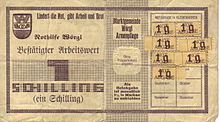Michael Unterguggenberger
Michael Unterguggenberger (born August 15, 1884 in Hopfgarten im Brixental , † December 19, 1936 in Wörgl ) was an Austrian local politician ( SPÖ ) and from 1931 to 1934 mayor of Wörgl ( Tyrol ).
job
Unterguggenberger, who initially worked as a sawmill worker after leaving school, began an apprenticeship as a mechanic in Imst in 1899 . In 1905, after completing his apprenticeship as a journeyman, he got a job with the railroad as a locomotive driver , later as an inspector and machine master . When he was elected in 1931 as mayor of Wörgl, he joined the train in retirement .
Political career
His political career began in 1912 when he joined the Social Democratic Party and the personnel commission of the Austrian State Railways . In 1919 the party sent him to the municipal council of Wörgl and in 1920 he became vice mayor . He held this office until his election as mayor in 1931. The Austrian Civil War in February 1934, which led to the banning of all left-wing parties, ended Unterguggenberger's political career.
Experiment from Wörgl
As a result of the global economic crisis of 1929, the economic situation in the region around Wörgl was marked by deflation in 1931 . A debt burden of 1.3 million schillings and 1,500 unemployed people, about half of whom were dependent on the welfare of the community, made it impossible to make even the most necessary investments . The amount of money in circulation tied to the gold reserves decreased noticeably.
Against this background, Michael Unterguggenberger worked out an emergency aid program to issue circulated free money as complementary currency worth 34,500 Schillings for the Wörgl region. The source of ideas for him was Silvio Gesell's free economy . On July 8, 1932, the money experiment was unanimously approved by the Wörgl municipal council.
Unterguggenberger's emergency aid program worked. Growing construction activity and consumer spending caused the number of unemployed in the region to fall by a quarter by 1933, while it continued to rise in Austria. The experiment received worldwide attention. In September 1933, the circulation of the Wörgl-Schilling was ended by court order at the instigation of the Oesterreichische Nationalbank AG .
Musician
Michael Unterguggenberger was a music-loving member of the workers' band of Wörgl in addition to his work for the railway and later as mayor of the community. He played several instruments and composed the commemorative festival march in 1912 on the occasion of the tenth anniversary of his band and some popular pieces for household use.
Honor
The municipality of Wörgl erected a monument to him for his services. In 2007 Michael Unterguggenberger was made an honorary citizen of the city of Wörgl posthumously . Unterguggenberger's ashes are buried in the north-eastern corner of the forest cemetery in Wörgl (open-air hiking trail).
In 2007, in honor of Unterguggenberger, the theater performance Unterguggenberger & the Liberation Experiment was premiered in Wörgl .
In autumn 2017 the feature film “ The Miracle of Wörgl ” about Unterguggenberger's “ Miracle of Wörgl ” was filmed as a joint production by ORF , BR and Arte , directed by Urs Egger . Karl Markovics plays the leading role ; the first broadcast took place in December 2018. A related documentary was entitled "The Money Maker - The Experiment of Michael Unterguggenberger".
literature
- Fritz Schwarz : The Wörgl experiment. Synergia, Darmstadt 2007, ISBN 978-3-9810894-5-5 (revised new edition, original: Bern 1951).
- Klaus Rohrbach: Free money. Michael Unterguggenberger and the “Wörgl currency miracle”. Möllmann, Hamborn Castle 2001, ISBN 3-931156-71-0
- Wolfgang Broer: Schwundgeld. Mayor Michael Unterguggenberger and the Wörgl currency experiment 1932/33. Studien-Verlag, Innsbruck / Vienna / Bozen 2007, ISBN 978-3-7065-4472-6
- Gerhard Drekonja-Kornat: Does Wörgl show the way? Or how do we come to responsible capitalism? In: Américas. 7th year, Volume 25, Issue 1, Vienna 2003, pp. 7-13.
Web links
- unterguggenberger.org Website of the Unterguggenberger Institute, an association that cultivates the legacy of the Wörgl money experiment
- Thomas Wendel: brandeins.de brand eins , 9/2003
- Wolfgang Uchatius: The miracle of Wörgl . In: Die Zeit , No. 52/2010
- Günter Hoffmann: The Wörgl free-field experiment and its consequences . MoneyMuseum , December 19, 2001
- The Wörgler Wirtschaftswunder (broadcast by Bayerischer Rundfunk)
Individual evidence
- ↑ The miracle of Wörgl . In: Die Zeit , No. 52/2010
- ^ Immo Fiebrig: Wörgl in the free money year. Unterguggenberger-Institut, Wörgl, accessed on December 14, 2011 .
- ↑ Karl Markovics is "The Money Maker". Österreichischer Rundfunk (ORF), September 28, 2017, accessed on November 13, 2017 .
- ↑ Susanne Poelchau: Documentary on the “Miracle of Wörgl”: The Money Maker - The Experiment of Michael Unterguggenberger. BR.de (Bayerisches Fernsehen), 2018, accessed on January 11, 2020 .
| personal data | |
|---|---|
| SURNAME | Unterguggenberger, Michael |
| BRIEF DESCRIPTION | Mayor of Wörgl (Tyrol) |
| DATE OF BIRTH | August 15, 1884 |
| PLACE OF BIRTH | Hopfgarten in Brixental |
| DATE OF DEATH | December 19, 1936 |
| Place of death | Worgl |

